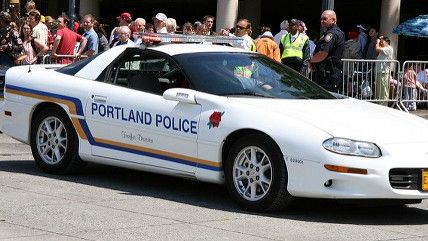Portland's Police Union and Outgoing Mayor Negotiate For Less Transparency For Body Cameras
Current police contract expires six months into next mayor's term, but is being renegotiated now.


When Portland (Ore.) Mayor Charlie Hales leaves office on Jan 1, 2017, there will be six months remaining on the current contract with the city's police union, the Portland Police Association (PPA). But the lame-duck Hales has been negotiating for months with the PPA on a new contract, which Mayor-elect Ted Wheeler will be bound to honor, even though his office will have had no say in the negotiations.
According to Check the Police—the Black Lives Matter-affiliated database which tracks police union contracts—the Portland Police Bureau already enjoys one of the U.S.'s more officer-friendly contracts. Portland officers can delay interrogations into their conduct for up to 48 hours following an incident, they can review video footage of incidents before giving interviews or submitting reports, misconduct records can have pertinent details omitted, and disciplinary actions taken against the officers by the department can be overturned by binding arbitration.
The biggest issue with the newly proposed police union contract, which Hales is pushing the City Council to swiftly ratify, are new policies regarding police body cameras. As reported by the Portland Mercury:
Under the policy, gang cops, transit cops, patrol officers, and others are all specifically required to wear body cameras. Left out? Cops working on the Special Emergency Reaction Team (SERT), Portland's version of SWAT.
That's a problem for oversight advocates. Portland Copwatch's Dan Handelman says the omission makes no sense, since such officers are "most likely as a unit to use implements of deadly force." The ACLU of Oregon has argued the same thing.
Hales, when asked about this omission on Monday, said he wasn't aware of it. But PPA President Daryl Turner argues the rule makes sense, since the city doesn't want to give up SERT's tactical secrets.
"They are highly trained individuals," Turner said. "We wouldn't want those things to be on camera."
There are also issues about what happens when an officer fails to turn his/her body camera on. The proposed contract grants officers the right to not record if they determine they are facing an "immediate threat" and don't have the time to press "record." And while Portland cops will be allowed to review their own body camera footage before writing up their report, oversight of such footage will be limited. Also according to the Mercury, "The policy contains provisions that say supervisors and professional standards officers can't look at video for a performance review or to discover policy violations, and that they may not 'randomly' review recordings of any officer."
In a searing op-ed published by Oregon Live, the president of Portland's NAACP chapter, Jo Ann Hardesty, also complained that "This contract is a big money giveaway without any public benefit." Hardesty adds:
The contract allows retired officers to be hired back for six years at the top of their pay grade — classic double-dipping at the expense of the taxpayer.
The contract ensures that the most expensive police officers are assigned to overtime first, rather than a mid-level employee or an officer who may be needed based on the situation. Both the taxpayer and the community suffer. ?
Contract stipulations that benefit older and more tenured employees—regardless of whether or not they are the most able or qualified—is pretty much standard operating procedure for any union, but especially so when it comes to public sector unions. That the PPA would want to strengthen the benefits afforded to its most senior members, as well as limit the transparency and accountability demanded of all its members, shouldn't come as a surprise.
The City Council has not set a date to vote on the proposed contract, but last week, approximately two dozen protesters occupied a portion of City Hall after disrupting a City Council meeting where the police union contract was scheduled to be discussed, forcing the building into a lockdown. Two were arrested.


Show Comments (22)